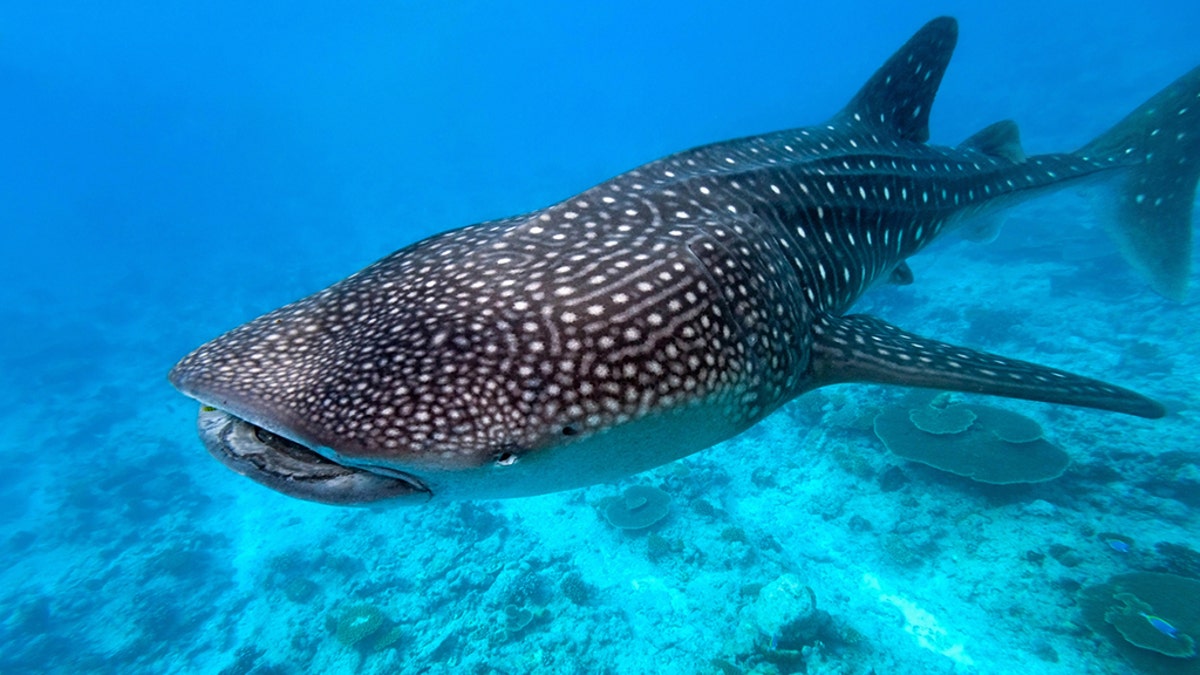
Whale sharks have eyes that are covered in teeth, researchers find
Published July 01, 2020
My, what big eyes you have... the better to eat you with?
Whale sharks, the largest non-mammal vertebrate in the world, have small teeth covering their eyeballs, researchers in Japan have discovered.
The research, published in PLOS One, notes that whale sharks have "armored eyes" due to the presence of dermal denticles. They also have the ability to retract their eyes into their eye sockets, a move that surprised the researchers.

Whale sharks do not have eyelids and, with their eyes at the corners of their heads, they are exposed to the elements moreso than other animals. (iStock)
MYSTERIOUS SCARS ON HAWAIIAN SHARK COULD BE SIGN OF GIANT SQUID ATTACK
"The eye denticle differs in morphology from that of the dermal denticles distributed over the rest of the body, consistent with a different function (abrasion resistance)," researchers wrote in the study's abstract. "We also demonstrate that the whale shark has a strong ability to retract the eyeball into the eye socket. The retraction distance was calculated to be approximately half the diameter of the eye, which is comparable to those of other vertebrates that are known to have highly retractable eyes."
The researchers continued: "These highly protective features of the whale shark eye seem to emphasize the importance of vision for environmental perception, which contradicts the general, though poorly established, notion of low reliance on vision in this species."
Whale sharks do not have eyelids and, with their eyes at the corners of their heads, they are exposed to the elements moreso than other animals.
The researchers looked at the eyes of living and dead whale sharks in both Japanese and American aquariums for their research. Approximately 3,000 denticles were discovered on a single eye, according to Gizmodo.
GREAT WHITE SHARKS HAVE SURPRISING DIET WHEN THEY'RE YOUNG, RESEARCHERS FIND
Whale sharks can be found in tropical waters, according to the World Wildlife Fund, and can weigh as much as 11 tons and stretch as long as 40 feet long.
An endangered species, whale sharks are "highly valued in the eco-tourism sector," according to the study's abstract. As such, effective "conservation and management strategies" are needed for the preservation of the species.
Whale shark sightings are somewhat rare. In 2018, a fisherman off the coast of Charleston, S.C., spotted one approaching his boat. In 2019, a whale shark in Florida gave a fisherman a wild ride, Fox News previously reported.
In June 2019, whale sharks were caught on camera mating in Western Australia for the first time ever.
A study published in April suggested that Cold War-era nuclear bombs could be used to determine how long whale sharks can live.
CLICK HERE TO GET THE FOX NEWS APP
https://www.foxnews.com/science/whale-sharks-eyes-covered-in-teeth
